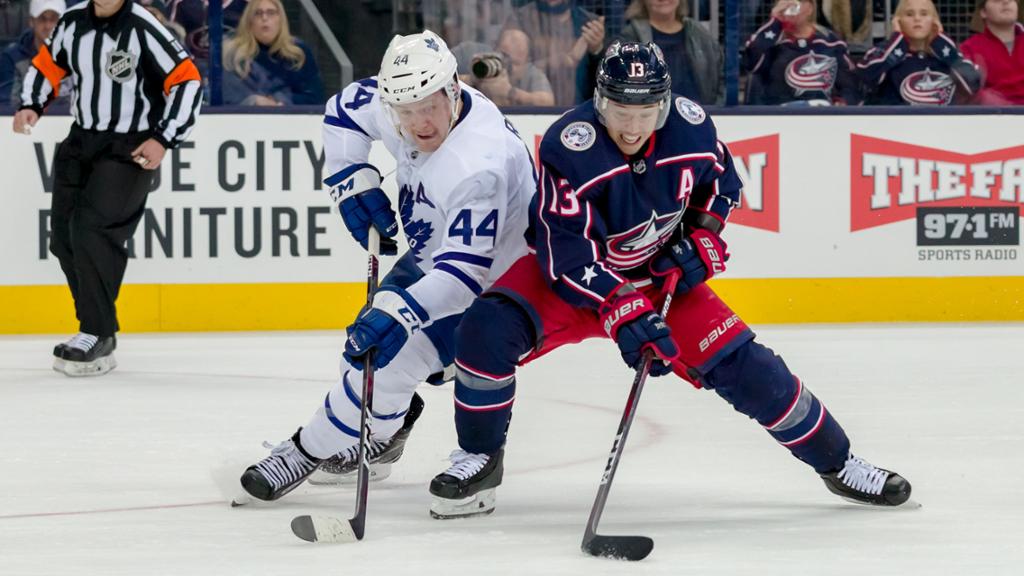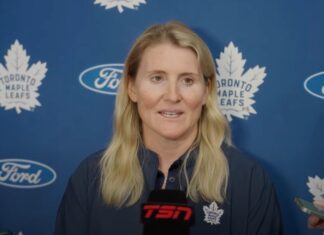In today’s Leafs Links, General Manager Kyle Dubas shines light on the decision to move Morgan Rielly to the second power-play unit last season as well as the possibility of 11F/7D lineups for next season, Elliotte Friedman provides the latest on the negotiations between the players and owners, and head coach Sheldon Keefe discusses the team’s offseason additions.
Kyle Dubas on Morgan Rielly’s leadership, 11F/7D (TSN)
At the Toronto’s annual Coaches Open House on Saturday, Kyle Dubas discussed Morgan Rielly volunteering to move to PP2 to accommodate Tyson Barrie, the possibility of 11 forwards / 7 defensemen lineups next season, and the team’s need to evolve its mindset when it comes to grit and toughness.
He started the year off and did one of the most selfless things that I have seen: In mid-November, he was on the first power play, and we had acquired Tyson Barrie the summer previous. Tyson got off to a fairly slow start with us — he hadn’t produced and hadn’t scored — and as someone who was facing unrestricted free agency in the new year, in a new city with a lot of expectations on him, he started to really struggle.
Morgan, when Sheldon came into the job, went to Sheldon and said he would have no problem, if it was what was best for the team, going to the second power-play unit to put Tyson on the first unit so that Tyson could get going. If we were going to reach our potential, everyone felt it was important that Tyson played the way we knew he was capable of playing.
I just thought that spoke so much to the character of Morgan Rielly and everything that he is about. About a month and a half later, he sustained a really bad injury — a broken foot on a blocked shot in Florida — and he had also been dealing with an injury in the first half of the season before he was hurt, which had kind of slowed him down. On any team, you need players like that who are willing to put the team ahead of themselves.
I thought, with Morgan Rielly, he has always done that here. When he came back and was fully healthy against Columbus, it was great to see him back at full bore — the way we all knew him to be. As a manager and a coach, you are always rooting, if you have players on your team that are so selfless in their actions, for them to ultimately have success. I think everybody does on the team does as well. We are really excited to see Morgan next year back and firing on all cylinders throughout the entire season.
Dubas on 11F/7D:
In 2016, I know Sheldon called Jon Cooper during our Marlies playoff run. They were in the Conference Finals against Hershey. We probably just felt the depth of our defense was better than what we were getting from the forward group. He actually called Jon because they had been doing it a lot back then in 2015 when they went to the Cup Final, and all the way through in ’16 and 17′, they have never been afraid to do that.
To me, I think it does a couple of things. Number one, it creates a real difficult matchup up front. If you go through your lines, you are really going to be running your top three lines a lot, or when it comes to the matchup, say the game starts and runs naturally, which doesn’t always happen — first line, second line, third line, fourth line. When your fourth line comes back again, you are going to have a member of your first line with that fourth line, so it is going to make it a little more potent. In our case, it could be Matthews, Tavares, Marner or Nylander playing — in this last year’s iteration — with Clifford and Spezza, just as a hypothetical. That makes it a far more potent line.
On defense, if the group of D has specific functions — and I think we will have a little bit more of that this year with the addition of Bogosian and Mikko Lehtonen. Lehtonen is more of an offensive guy who thrives on the power play. Bogosian has been an excellent penalty killer in his career, and he is used to this [7D] system and was deployed that way by Tampa. Our feeling is that, whether it is a Sandin or Liljegren as they come up and continue to get worked in, the depth of our D will lend itself to this. I wouldn’t be surprised to see us use it from time-to-time during the season. In the end, it will be Sheldon’s call.
The matchups up front and the flexibility that it gives you on defense are certainly intriguing. As it has been shown now, it certainly works in leading a team to a championship. I think you will see a lot more teams do it. As you know, the championship teams tend to get mimicked.
Dubas on team toughness and the maturation of the core:
When a team hasn’t had playoff success, they question sometimes the toughness or the grit of the team. One of the things that we have really focused on… Last year, we brought in Kyle Clifford. He certainly brings that element. This summer, it has been Simmonds, Bogosian… even Thornton, I would put in that class as well, and Jimmy Vesey was brought in as a free agent as well. They play hard and they have a physical side to them, in addition to their talent.
There is so much focus sometimes on bringing in one or two players and the impact they can make. The reality is that if the level of competitiveness and grit — or toughness, as we term it — is going to permeate through the locker room, it is going to be through the maturity of the group that is already there. Our core group, I think, really embracing the fact that this is a wonderful opportunity, if they are willing to sacrifice a little bit in each of their own individual realms — as all young teams with superstar players have to go through — then we will really reach our full potential.
When we talk about it internally and how we are going to bring it out of them, when we talk about toughness with our group, it is very simple the way we define it: If there is a 50/50 puck, do you desperately want to win that puck every single time? Are you willing to be the first one on the puck and go to the difficult areas of the ice with and without the puck and be successful? Are you willing to endure the physical duress that is going to be on you if we are going to go as far as we want to go and do it every single night — through the regular season and, more importantly, in the playoffs — and be able to score the way you need to score in the playoffs and defend the way you need to defend in the playoffs?
That gets built over time. This is Sheldon and I’s first offseason together at this level, and it is something we have done at every other level in the AHL and OHL: Setting the tone in the summer of what the expectations are for the players coming back in. What are the standards in terms of fitness and strength and all of those areas in order to know what is going to be fully expected of the group when they come back?
The reality that we have learned about what needs to change is really in our mindset. A term we have used for our team is that we find we wait. This year, in 2020, I thought what happened was — in Game 1 and Game 5, when we had the opportunity to kind of take hold of the series and go out and grab it, as our talent dictates we should be able to, it was the same thing: We were on our heels kind of waiting to see what would happen in the game rather than going out and attacking the opportunity that was there and forcing the other team to respond to us.
It is one thing we have talked to the players a lot about this offseason. One of the things that we have looked at deeply for why that is: Part of it is maturity, part of it is experience, but both of those things go into the mindset and what the mindset of the group is. We have to stop waiting. We are waiting for our potential just to happen. We have to start going out and exercising that and making it happen, forcing other teams to respond to us.
Friedge on where things are between players & owners on ’20-21 (Sportsnet)
On the 31 Thoughts podcast, Elliotte Friedman provided his latest feel for the temperature of the negotiations between the players and owners surrounding the 2020-21 NHL season.
I think the pressure point is the NBA. When this all kicked up again, it was when the NBA announced it was playing. What is supposed to happen next week? The NBA is supposed to begin training camp.
We don’t know if any of this is going to happen. The NFL is hanging on. College football is canceling 20 games a week. It is a huge challenge. The second wave, as predicted, is here and it is massive. You’ve got this thing you’re at the mercy of.
The NBA is supposed to have its training camps next week. If the NBA players show up to their camps and we have no such date for the NHL, people are going to be saying, “What are we doing here? What is our schedule?” That is a big pressure point.
Another thing I’ve heard second hand: The NBA and its players signed a new CBA about a month ago. I’ve heard that the team owners in the NHL who also have NBA teams — which includes, for example, Toronto — have seen the NBA deal and think the owners there got a better deal.
I am hearing this second hand and haven’t seen the full CBA, so I don’t know if that is true, but that is the early word I am starting to get: That the NBA owners got a better deal than the NHL owners did — and if that is true, you know there is going to be grumbling about it. That is one of the things that, behind the scenes, has been a bit of an issue here.
Friedman on the current sticking points in the negotiations:
The league has asked for increased deferrals and the possibility of raising the escrow caps. The escrow is capped at a certain percentage in all of the years of the new CBA, and they asked for either a raise this year or a raise in years 4, 5, and 6 of the deal when the escrow caps are at their lowest at 6%. The players, apparently from what I understand — I don’t think it was a formal vote — have indicated they don’t want to counter. They don’t believe in the escrow raise. While they are willing to hear about deferred money, they want to know what they are going to get out of it.
The league’s position is: This is a 50-50 deal and we split the revenues 50/50. If we don’t have fans this year and we know we are going to start mostly without fans, it tips way past 50/50, so how are we going to make this up? The player’s position is: We signed the deal, so how is it our problem?
The players also say, “We just went through the bubble. We did it for this reason, and we hated the bubble.” A lot of the people I know who own businesses understand where the owners are coming from: They see that, if it is a 50-50 deal, you have to find a way for it to be 50/50. The players are like, “No, you signed a deal, and that is that.”
Where there is some added frustration on the owner is two places: 1) Bettman and Fehr were like, “We have to save this year. We have to get a deal done to save this year.” They raced to get a deal done, and some other things came up. This turned out to be worse than they expected. The owners were kind of held out of the negotiation and they are mad about that. There are some owners who feel, if they had more knowledge about what was going on in negotiations, this would’ve been different. Some of them are squawking about that.
The other thing is: I know there are players who were really angry last week. Some players have made comments that it has never been cheaper to borrow money. It really pissed off some owners. One called me and we were kind of laughing about it at the end, but a lot of these guys weren’t laughing. “We have major skin in the game here, and some of our businesses are getting pounded.” There are some owners who have done well during the lockdown, but there are a lot who have been completely hammered, particularly if you are in the hospitality business. I think they saw the comment as just riling them up and infuriating them. I think that set everything back.
At the end of the day, I think we are going to play, but the feelings are a bit raw. Some of the owners’ position is: What do you get in exchange? You get to play, and you are going to get paid, and you are not going to lose a year of salaries. To the players, that is not enough.
Friedman on how he would approach the negotiations as a player:
If I am a player, what am I asking about is how to increase revenue. The commissioner has apparently asked for $300 million in deferments or escrow changes. If I am a player, I am saying, “If you want me to defer, I will defer, but I want some commitment to growing revenue.” For example, there are two things the league has been unwilling or uncomfortable with doing that they could consider doing.
One is ads on jerseys. Bettman has said in the past that the number has got to be worth it. We are not talking about European hockey jerseys where you look like a 1950s bumper sticker, but something small in a corner and enough that you know it is there. In the NBA, there is a small little logo near the top of the jersey. You can see it, but it is not all over the place. It is enough that you know it is there. It is tasteful.
Bettman has said in the past that you need to hit a number that makes it worth it for teams like the Montreal Canadiens, Toronto Maple Leafs, and New York Rangers. If I am player, I am saying it is time. If the Boston Celtics and New York Knicks can have it… If I am a player, I am saying, “If you want us to give back money, you have to agree to maximize the revenues.”
The other thing is the expanded playoffs. They tried it last year in the bubble and it is in the CBA. Bettman is not a fan, but it shouldn’t matter anymore. If you ask any team owner the difference in team revenue — ticket sales, everything else — if you make the playoffs or miss the playoffs… If you give four more teams the chance to compete in that round, you can now say our ticket sales are going to go up next year, our concessions are going to go up, our sales are going to go up. If I am a player, that should be the only factor.
There is a new TV deal coming up in the U.S. Isn’t it more valuable with more meaningful games and extra playoff rounds, even if it is best two out of three? It is more meaningful games with more teams in the race. If I am a player, I am saying, “You want this from us, but you have to maximize the revenue. No more saying we only like 16 teams in the playoffs. We are going for 20 to increase the revenues.”
Sheldon Keefe on Thornton, Bogosian & Brodie additions (TSN)
Leafs head coach Sheldon Keefe discussed the team’s new additions with Mark Masters of TSN.
Keefe on Zach Bogosian:
He is a guy with a great deal of experience and perhaps the most valuable experience, given what he’s just gone through in adjusting to a new team, finding his place in a new team, and ultimately being a part of a team that was trying to find its way and get over its own humps to win a championship in Tampa Bay. He’s going to bring a lot not only on the ice, but in the locker room as well. He’s got great energy about him.
Keefe on Joe Thornton:
He is a very versatile guy that we think can play anywhere in our lineup depending on what we need or what’s happening. With him coming here he’s going to be an important piece of our team. He’s coming here for a reason and we’re bringing him for a reason. We’re really excited to bring in somebody with his experience, his energy and the passion that he still has for the game. So, no matter where he plays he’s going to bring a lot to us and we’re excited about that and I know our players are as well.”
























![[Leafs Links] Reports: Sean Walker likely to be moved, Maple Leafs have inquired; the latest on Chris Tanev, Noah Hanifin, Adam Henrique, Scott Laughton, Jakob Chychrun & more Sean Walker linked to the Maple Leafs](https://mapleleafshotstove.com/wp-content/uploads/2024/01/sean-walker-maple-leafs-flyers-218x150.jpg)
![[Leafs Links] The asking price for Sam Lafferty and Vladislav Gavrikov, the latest on Patrick Kane, and is Toronto lurking as a darkhorse on Timo Meier? Patrick Kane, Chicago Blackhawks trade rumours](https://mapleleafshotstove.com/wp-content/uploads/2023/02/patrick-kane-blackhawks-218x150.jpg)
![[Leafs Links] Marlies head coach names a defenseman to look out for in the Leafs’ farm system; Bruins sniffing around on Chychrun, Schenn; a timeline for Patrick Kane and Jonathan Toews’ deadline decisions Jakob Chychrun, Toronto Maple Leafs trade target](https://mapleleafshotstove.com/wp-content/uploads/2022/02/jakob-chychrun-218x150.jpeg)









